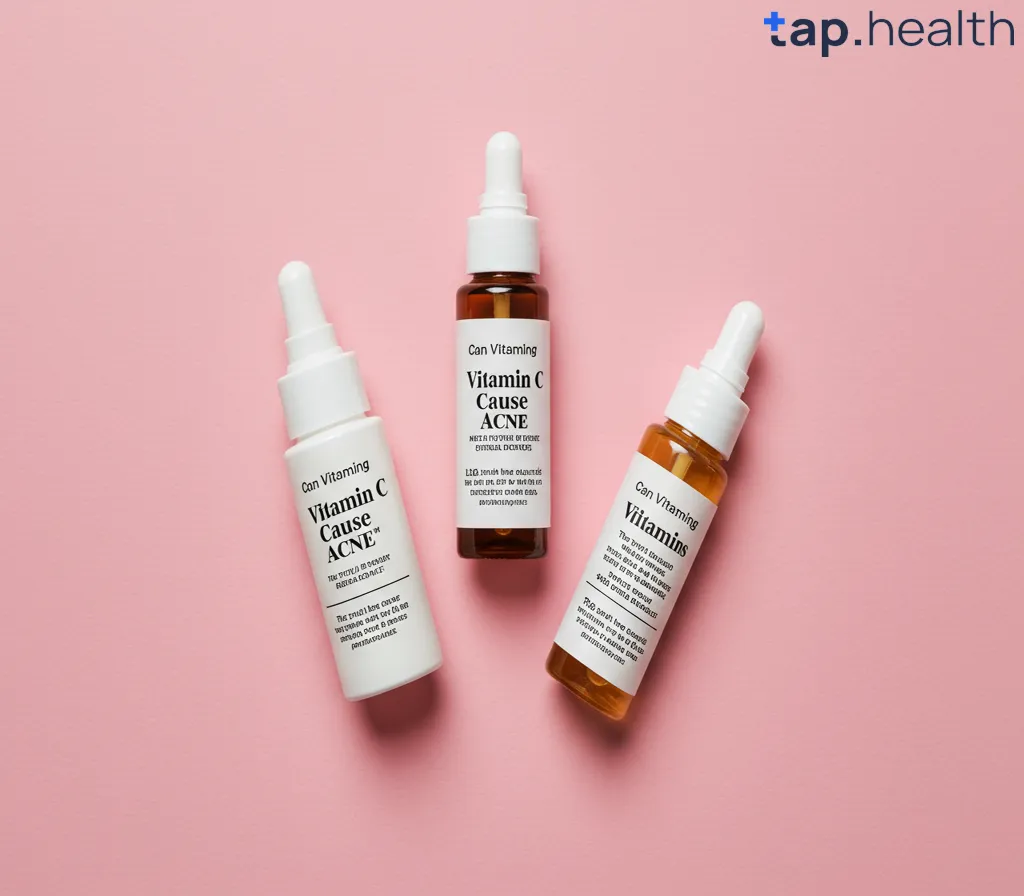You’ve probably heard that vitamin C is a superhero for your skin. It brightens, protects, and helps heal. But lately, you might have come across people saying, “Wait—can vitamin C cause acne?” That’s confusing, right? If it’s so good, why would it cause breakouts?
This question pops up a lot in skincare forums, dermatology clinics, and Google searches. And it makes sense to ask. After all, you don’t want to use something that’s supposed to help your skin—only to end up with more pimples.
So let’s get to the bottom of it. In this article, we’ll explore:
- Whether vitamin C actually causes acne
- The difference between oral (pill) and topical (cream/serum) vitamin C
- How your skin reacts to vitamin C products
- Who should be careful using vitamin C
- How to use vitamin C safely without breaking out
- And much more
We’ll keep things simple, clear, and backed by real science from trusted health sources like the National Institutes of Health (NIH), Mayo Clinic, American Academy of Dermatology (AAD), and peer-reviewed journals.
Let’s dive in.
What Is Vitamin C and Why Is It Important?
Vitamin C, also known as ascorbic acid, is a powerful antioxidant your body can’t make on its own. That means you need to get it from food or supplements.
It plays a key role in:
- Making collagen (the protein that keeps your skin firm)
- Healing wounds
- Protecting your cells from damage
- Boosting your immune system
You find vitamin C in citrus fruits (like oranges and lemons), strawberries, bell peppers, broccoli, and many other fruits and veggies.
Because of its skin benefits, vitamin C is also a star ingredient in many skincare products—serums, moisturizers, face masks, and toners.
But here’s the big question: if it’s so good, could it ever cause acne?
Let’s look at the facts.
Can Taking Vitamin C Supplements Cause Acne?
Short answer: No, vitamin C supplements do not directly cause acne.
But let’s go deeper.
There is no scientific evidence that taking vitamin C pills leads to acne breakouts. In fact, some studies suggest that people with acne often have lower levels of antioxidants like vitamin C in their bodies.
A 2013 study published in the Journal of Clinical and Aesthetic Dermatology found that acne patients had significantly lower levels of vitamin C, vitamin E, and other antioxidants compared to people with clear skin. This suggests that vitamin C might actually help reduce acne, not cause it.
So Why Do Some People Think Supplements Cause Breakouts?
There are a few possible reasons:
1. It Might Be the Other Ingredients in the Supplement
Some vitamin C supplements contain fillers, binders, or added sugars. These ingredients—especially if taken in large doses—might irritate the gut or trigger inflammation in sensitive people, which could indirectly affect the skin.
Also, some supplements come with added vitamin B12 or iodine, which have been linked to acne in rare cases. So if you’re breaking out after starting a new supplement, check the label. It might not be the vitamin C.
2. Too Much Vitamin C Can Cause Digestive Issues
The body can only absorb so much vitamin C at once. The recommended daily amount for adults is about 75–90 mg, but many supplements contain 500 mg, 1000 mg, or even more.
When you take too much, your body can’t use it all. The extra gets flushed out through your urine—but before that, it might cause:
- Diarrhea
- Nausea
- Stomach cramps
These digestive issues can stress your body. And when your body is stressed, your hormones can go out of balance. Hormonal imbalance is a known trigger for acne.
So indirectly, mega-doses of vitamin C might contribute to breakouts—but not because of the vitamin itself. It’s more about how your body reacts to the overload.
3. Everyone’s Body Is Different
Some people are more sensitive to changes in diet, supplements, or routine. If you start taking a new supplement and notice breakouts, it’s natural to blame it—even if it’s not the real cause.
Other factors like stress, diet, sleep, or skincare routine changes might be the real culprits.
Bottom Line: Oral vitamin C supplements do not cause acne. In fact, they may help improve skin health. But very high doses might cause side effects that indirectly affect your skin.
Can Topical Vitamin C (Serums, Creams) Cause Acne?
Now this is where things get more complicated.
Yes, some people do break out when they start using vitamin C skincare products—but again, it’s not the vitamin C itself causing acne.
Let’s break it down.
How Does Topical Vitamin C Work?
Topical vitamin C is applied directly to the skin, usually in the form of a serum. It works by:
- Neutralizing free radicals (which damage skin)
- Boosting collagen production
- Fading dark spots and sun damage
- Reducing inflammation
It’s especially helpful for people with dull skin, acne scars, or signs of aging.
But here’s the catch: not all vitamin C products are created equal.
Why Might a Vitamin C Serum Cause Breakouts?
1. It’s Not Pure Vitamin C – It’s the Formula
Most vitamin C serums don’t contain just pure ascorbic acid. They include other ingredients like:
- Oils (jojoba, coconut, mineral oil)
- Thickeners (like glycerin or silicones)
- Preservatives
- Fragrances
Some of these ingredients are comedogenic, meaning they can clog pores. If a product contains coconut oil or lanolin, for example, it might trigger acne in people with oily or acne-prone skin—even if the vitamin C is fine.
So if you break out, it’s likely not the vitamin C—it’s the other stuff in the bottle.
2. Your Skin Might Be Reacting to the Acidity
Pure vitamin C (L-ascorbic acid) is acidic. Most effective serums have a low pH (around 3.0 to 3.5) to help the vitamin penetrate the skin.
But low pH can irritate sensitive skin. When skin gets irritated, it can become inflamed. Inflamed skin is more likely to develop pimples.
Also, irritation can damage the skin barrier. A weak skin barrier can’t protect against bacteria and oil buildup—two big causes of acne.
So in short: the acidity of vitamin C might irritate your skin, which could lead to breakouts in sensitive individuals.
3. You Might Be Using Too Much or Too Often
More is not always better.
Using a vitamin C serum twice a day when your skin isn’t used to it can be too much. Overuse can lead to redness, peeling, and even small pimples that look like acne (but are actually irritation bumps).
Start slow—once every other day—and build up tolerance.
4. Your Skin Is Purging (Not Breaking Out)
This is a big one.
Sometimes when you start a new active skincare product (like vitamin C, retinol, or exfoliants), your skin goes through a “purge.” This means it’s pushing out clogged pores and dead skin cells faster than usual.
Purging looks like small whiteheads or pimples, usually in areas where you normally get breakouts. It lasts 4–6 weeks and then clears up.
True breakouts, on the other hand, happen in new areas, are more painful, and don’t go away quickly.
So if you just started using vitamin C and see a few new pimples, give it time. It might be purging, not acne.
Bottom Line: Vitamin C serums don’t cause acne directly. But the formula, acidity, or overuse might irritate your skin or clog pores—leading to breakouts in some people.
Who Should Be Cautious With Vitamin C Skincare?
Not everyone should jump into using vitamin C serums right away. Here’s who needs to be careful:
1. People with Sensitive Skin
If your skin stings easily, turns red, or feels tight after using products, you have sensitive skin.
Vitamin C, especially in high concentrations (15%–20%), can be too strong. It might cause irritation, redness, or tiny bumps that look like acne.
👉 Tip: Start with a lower concentration (5%–10%) and patch test first.
2. People with Oily or Acne-Prone Skin
If you already struggle with oily skin or frequent breakouts, you need to check the other ingredients in your vitamin C product.
Avoid serums with:
- Coconut oil
- Lanolin
- Mineral oil
- Heavy silicones
Look for labels that say “non-comedogenic” or “oil-free.”
3. People with Rosacea or Eczema
These skin conditions involve a weakened skin barrier. Applying acidic products like vitamin C can make redness, burning, or flaking worse.
If you have rosacea or eczema, talk to your dermatologist before using vitamin C.
4. People Using Other Active Ingredients
Using vitamin C with other strong products (like retinol, AHAs, or benzoyl peroxide) can be too much for your skin.
Combining them might cause irritation, dryness, or chemical burns—especially if you don’t space them out.
Tip: Use vitamin C in the morning and retinol at night. Don’t mix them.
How to Use Vitamin C Safely Without Causing Acne
Want to use vitamin C without breaking out? Follow these simple steps:
1. Patch Test First
Before slathering a new serum on your face, test it on a small area—like behind your ear or on your jawline.
Wait 24–48 hours. If there’s no redness, itching, or bumps, it’s probably safe to use.
2. Start with a Low Concentration
Begin with a 5% to 10% vitamin C serum. Once your skin adjusts (after 2–4 weeks), you can move up to 15% or 20% if needed.
High concentrations aren’t always better—especially for beginners.
3. Use It Once a Day (Morning is Best)
Apply your vitamin C serum in the morning after cleansing and before moisturizing and sunscreen.
Why morning? Because vitamin C helps protect your skin from sun damage and pollution during the day.
Don’t use it more than once daily unless your skin is used to it.
4. Don’t Mix It with Certain Ingredients
Avoid combining vitamin C with:
- Benzoyl peroxide (can make vitamin C less effective)
- Retinol (can cause irritation)
- AHAs/BHAs like glycolic or salicylic acid (can increase sensitivity)
If you use these, apply them at different times of day.
5. Choose the Right Formula for Your Skin Type
- Oily/Acne-Prone Skin: Look for water-based, oil-free, non-comedogenic serums.
- Dry Skin: A serum with hyaluronic acid or glycerin can help hydrate.
- Sensitive Skin: Try a gentler form of vitamin C like magnesium ascorbyl phosphate instead of L-ascorbic acid.
6. Store It Properly
Vitamin C breaks down when exposed to light and air. Keep your serum in a dark, airtight bottle and store it in a cool, dry place—some people even keep it in the fridge.
If your serum turns dark yellow or brown, it’s oxidized and less effective. Time to replace it.
Pro Tip: Pair vitamin C with sunscreen. It boosts sun protection and helps prevent dark spots from acne scars.
Can Vitamin C Help Treat Acne?
Yes! While it might cause irritation in rare cases, vitamin C can actually help treat and prevent acne—when used correctly.
Here’s how:
1. Reduces Inflammation
Acne isn’t just about clogged pores—it’s also about inflammation. Vitamin C is a powerful anti-inflammatory. It can calm red, swollen pimples and speed up healing.
A 2017 study in the Dermatology and Therapy journal found that topical antioxidants like vitamin C helped reduce inflammatory acne lesions.
2. Fades Acne Scars and Dark Spots
One of the best things about vitamin C is its ability to brighten skin and fade post-acne marks (called post-inflammatory hyperpigmentation).
It does this by blocking the enzyme that makes melanin (skin pigment). Less melanin = lighter dark spots.
3. Strengthens the Skin Barrier
A healthy skin barrier keeps moisture in and irritants out. Vitamin C supports collagen production, which helps keep your skin strong and resilient.
Stronger skin is less likely to get infected or inflamed—two key factors in acne.
4. Protects Against Environmental Damage
Pollution, UV rays, and dirt can worsen acne. Vitamin C acts as a shield, neutralizing free radicals before they damage your skin.
Think of it like an invisible helmet for your face.
Bottom Line: Vitamin C doesn’t cause acne—when used right, it can actually help clear it up and prevent future breakouts.
Does the Type of Vitamin C Matter?
Yes! Not all vitamin C is the same. There are different forms, and some are gentler than others.
Here are the most common types:
1. L-Ascorbic Acid
- The most effective and well-researched form
- Works best at low pH (3.0–3.5)
- Can be irritating for sensitive skin
- Best for normal to oily skin
2. Sodium Ascorbyl Phosphate
- A stable, water-soluble form
- Less irritating
- Good for acne-prone skin
- Studies show it can reduce acne lesions
3. Magnesium Ascorbyl Phosphate
- Gentle and stable
- Great for sensitive or dry skin
- Helps with hydration and brightening
4. Ascorbyl Palmitate
- Oil-soluble form
- Less effective than L-ascorbic acid
- Often used in moisturizers
For acne-prone or sensitive skin: Choose sodium ascorbyl phosphate or magnesium ascorbyl phosphate.
For anti-aging and brightening: L-ascorbic acid is the gold standard—if your skin can handle it.
Can Too Much Vitamin C Damage Your Skin?
Using too much vitamin C—especially in skincare—can do more harm than good.
Signs You’re Using Too Much:
- Redness
- Burning or stinging
- Peeling or flaking
- Dryness
- Small bumps or breakouts
This is called skin irritation, not acne. But it can look similar.
Over time, constant irritation can weaken your skin barrier, making you more prone to breakouts, infections, and sensitivity.
How to Fix It:
- Stop using the product for a few days
- Switch to a gentle moisturizer
- Reintroduce vitamin C slowly (every other day)
- Try a lower concentration
Remember: skincare is not a race. Consistency and patience work better than harsh routines.
Does Diet Affect Acne More Than Supplements?
Yes. While vitamin C supplements don’t cause acne, your overall diet plays a big role in skin health.
Foods that may trigger acne include:
- High-sugar foods (candy, soda, pastries)
- Dairy products (especially skim milk)
- Refined carbs (white bread, chips)
These foods can spike insulin levels, which increases oil production and inflammation—both linked to acne.
On the other hand, foods rich in antioxidants (like vitamin C) can help fight acne.
So instead of worrying about vitamin C supplements, focus on eating a balanced diet with:
- Fruits and veggies (oranges, kiwis, bell peppers)
- Whole grains
- Lean proteins
- Healthy fats (avocados, nuts, olive oil)
Bonus: Eating vitamin C-rich foods also helps your skin absorb the nutrient better than pills.
Can Vitamin C Interact With Acne Medications?
Yes, it can—so be careful.
If you’re using prescription acne treatments like:
- Tretinoin (Retin-A)
- Differin (adapalene)
- Benzoyl peroxide
- Oral antibiotics
…you should talk to your dermatologist before adding vitamin C to your routine.
Why?
- Benzoyl peroxide can make vitamin C less effective by oxidizing it.
- Tretinoin and vitamin C are both active ingredients. Using them together can cause severe dryness or irritation.
- Some combinations may increase sun sensitivity.
Best Practice: Use vitamin C in the morning and acne medication at night. Always wear sunscreen.
Natural Sources of Vitamin C vs. Supplements: Which Is Better?
When it comes to acne and skin health, getting vitamin C from food is usually better than pills.
Here’s why:
1. Better Absorption
Your body absorbs vitamin C more efficiently from food than from supplements.
2. No Risk of Overdose
You can’t get too much vitamin C from food. But high-dose supplements (over 2,000 mg daily) can cause diarrhea, nausea, and kidney stones in rare cases.
3. Extra Nutrients
Fruits and veggies don’t just give you vitamin C. They also provide fiber, other antioxidants, and phytonutrients that support overall health and clear skin.
Top Vitamin C-Rich Foods:
- Oranges (70 mg per medium fruit)
- Kiwi (64 mg per fruit)
- Bell peppers (152 mg per cup, raw)
- Strawberries (98 mg per cup)
- Broccoli (89 mg per cup, cooked)
- Guava (126 mg per fruit)
Eating a variety of these daily gives you more than enough vitamin C—without any risk of acne.
Common Myths About Vitamin C and Acne
Let’s clear up some common misunderstandings:
Myth 1: “Vitamin C Clogs Pores”
False. Pure vitamin C does not clog pores. But some vitamin C products might—because of added oils or thickeners.
Always check the ingredient list.
Myth 2: “If It Stings, It’s Working”
Nope. Stinging means irritation. Healthy skincare shouldn’t hurt.
If your skin burns, stop using it.
Myth 3: “More Vitamin C = Clearer Skin”
Not true. Using too much can damage your skin barrier and cause more breakouts.
Less is often more.
Myth 4: “Only Expensive Serums Work”
Not necessarily. Some affordable brands have effective, well-formulated vitamin C products.
Look at the ingredients, not the price.
When to See a Dermatologist
If you’re using vitamin C and still breaking out, it might be time to see a skin doctor.
You should consult a dermatologist if:
- Breakouts get worse after starting vitamin C
- Your skin becomes red, itchy, or swollen
- You develop a rash or hives
- You’re unsure whether it’s purging or a reaction
- You have persistent acne that doesn’t improve with skincare
A dermatologist can help you:
- Choose the right vitamin C product
- Rule out allergies or sensitivities
- Create a safe, effective skincare routine
Final Thoughts: Can Vitamin C Cause Acne?
After looking at all the science and real-world experiences, here’s the truth:
No, vitamin C does not cause acne.
- Oral supplements do not trigger breakouts and may even help improve skin health.
- Topical vitamin C does not clog pores or cause acne—but poor formulas, overuse, or skin sensitivity might lead to irritation that looks like breakouts.
- In many cases, vitamin C actually helps treat acne by reducing inflammation, fading scars, and protecting the skin.
The key is choosing the right product, using it correctly, and listening to your skin.
If you have sensitive or acne-prone skin, start slow, patch test, and avoid heavy or oily formulas.
And remember: no single ingredient is a magic fix. Clear skin comes from a combination of good skincare, a healthy diet, stress management, and sometimes medical treatment.
So go ahead—use vitamin C with confidence. Just do it the smart way.
Frequently Asked Questions (FAQ) on Can Vitamin C Cause Acne? The Truth Behind Vitamin C and Breakouts
Can vitamin C serum cause hormonal acne?
No, vitamin C serum does not cause hormonal acne. Hormonal acne is driven by internal factors like hormones, stress, and genetics—not topical skincare. However, if a serum irritates your skin, it could worsen existing breakouts.
Does vitamin C make acne worse before it gets better?
Sometimes. If you’re experiencing a “purge,” your skin might temporarily get more pimples as it clears out clogged pores. This usually lasts 4–6 weeks. True worsening (allergic reaction or irritation) means you should stop using it.
Is vitamin C good for acne-prone skin?
Yes, when used correctly. Vitamin C reduces inflammation, fades acne marks, and strengthens the skin. Just choose a non-comedogenic, oil-free formula and start with a low concentration.
Can too much vitamin C give you pimples?
Not directly. But high-dose supplements might cause digestive stress, and overusing topical vitamin C can irritate the skin—both of which might indirectly lead to breakouts.
Does vitamin C clog pores?
Pure vitamin C does not clog pores. But some vitamin C products contain comedogenic ingredients (like oils or silicones) that can. Always check the label.
Can I use vitamin C with salicylic acid?
Yes, but with caution. Both are active ingredients. Using them together may cause irritation. Try using vitamin C in the morning and salicylic acid at night.
What form of vitamin C is best for acne-prone skin?
Sodium ascorbyl phosphate is the best form for acne-prone skin. It’s less irritating and has been shown in studies to reduce acne lesions.
Can vitamin C cause cystic acne?
No. Cystic acne is deep, painful, and caused by internal factors like hormones and bacteria. Vitamin C cannot cause it. However, if a product irritates your skin, it might worsen inflammation.
How long does it take for vitamin C to fade acne scars?
Most people see improvement in 4–12 weeks with consistent daily use. Dark spots may fade faster, while deeper scars take longer.
Should I stop using vitamin C if I break out?
Not necessarily. If it’s purging (small pimples in usual breakout zones), give it 4–6 weeks. If it’s irritation (redness, burning, new rashes), stop and switch to a gentler product.
Can I use vitamin C every day?
Yes, once your skin builds tolerance. Start every other day, then move to daily use. If your skin feels dry or sensitive, scale back.
Does vitamin C help with blackheads?
Indirectly. Vitamin C won’t unclog blackheads, but it can improve skin texture and reduce oil oxidation (which contributes to blackheads). Pair it with salicylic acid for best results.



